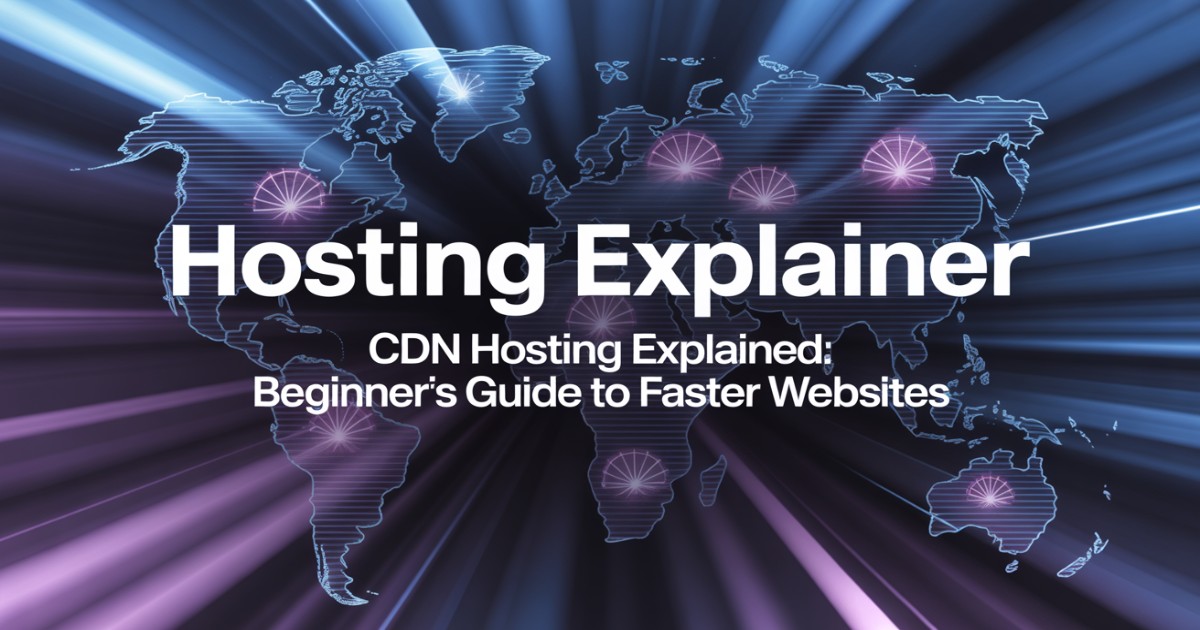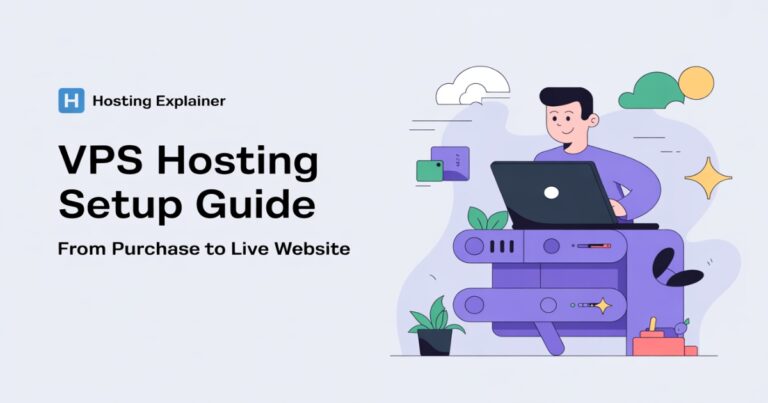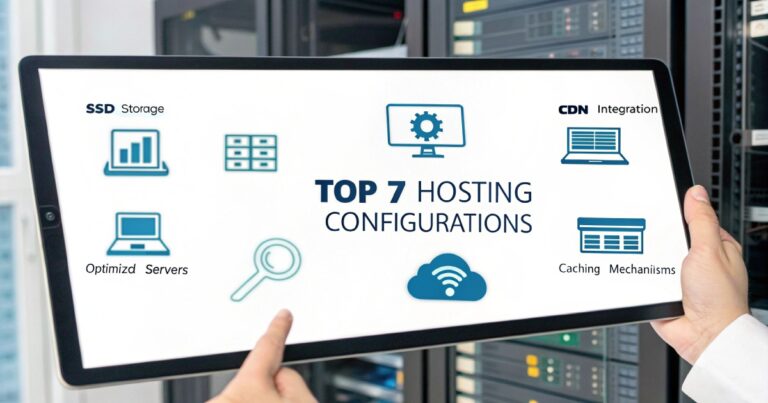CDN Hosting Explained: Beginner’s Guide to Faster Websites
If you’ve ever clicked on a website and waited too long for it to load, you’ve felt the problem a CDN solves. A few seconds of delay is enough to make people leave.
I’ve been there myself, refreshing a slow site and feeling frustrated. That’s where CDN hosting steps in. It speeds things up by delivering your site’s content from servers closer to your visitors.
Let’s break this down in simple terms so you can see why CDNs matter, how they work, and if they’re worth it for your website.
What Is a Content Delivery Network (CDN)?
A content delivery network, or CDN, is a system of servers placed around the world. Instead of sending all traffic to one central server, a CDN stores copies of your site’s files across multiple locations. When someone visits your site, the CDN delivers content from the server closest to them.
Think of it like local warehouses. If you order shoes online, they ship from the nearest warehouse, not across the country. A CDN works the same way for your website’s images, scripts, and videos.

How Does CDN Hosting Work?
Here’s the short answer: CDN hosting works by caching your site’s content on servers in many locations. When a visitor loads your page, the request is routed to the nearest server, called an edge server. This reduces the distance data has to travel, which lowers latency and speeds things up.
For example, if your main server is in California but your visitor is in New York, the CDN will serve the content from a nearby East Coast server. That’s why websites with CDNs feel faster worldwide.
I noticed this when I first enabled Cloudflare on one of my WordPress sites. Visitors from Europe saw pages load almost twice as fast because the files came from a closer server.
CDNs handle two main types of content:
- Static content (like images, stylesheets, and JavaScript files) is cached and delivered quickly.
- Dynamic content (like personalized dashboards or shopping carts) may still come from your main server, but many modern CDNs are smart enough to optimize this too.
Some CDNs even compress images, block malicious requests, and apply real-time routing so traffic always takes the fastest path. That’s why they’re not just about speed but also about security and reliability.
CDN Hosting vs. Regular Web Hosting
At this point, you may wonder: Is CDN hosting the same as web hosting? Not really. They serve different roles.
- Web hosting stores all your site’s data on a central server.
- CDN hosting makes copies of that data and spreads it across the globe.
The two work together. Hosting is your foundation, while a CDN is like a booster that improves speed and reliability.
Here’s a quick comparison:
| Features | Regular Hosting | CDN Hosting |
| Server Location | One main server | Many servers worldwide |
| Speed for Visitors | Slower if far away | Faster due to edge servers |
| Security | Basic (SSL, firewall) | DDoS protection, advanced SSL |
| Reliability | Can fail under load | Handles spikes with load balancing |
CDN hosting doesn’t replace your main hosting; it enhances it. Think of your web host as the foundation of your site, while the CDN acts like a global accelerator, improving speed, reliability, and security.
Together, they ensure your visitors get a fast, smooth experience no matter where they are.
Benefits of Using CDN Hosting
So why should you care about a CDN? The benefits are clear.
1. Faster Website Speed and Performance
A CDN reduces load time by serving cached content from nearby servers. This is one of the best ways to improve user experience and SEO rankings.
2. Reduced Latency and Better User Experience
Latency is the small delay before data moves. With a CDN, this delay shrinks. Your visitors get pages faster, which keeps them engaged. I once switched a client site to CDN hosting and saw bounce rates drop by 15%.
3. Security Enhancements with CDN Hosting
Most CDNs include DDoS protection, SSL certificates, and firewalls. That means fewer attacks get through. If you run an online shop, this extra layer of security is a must.
4. Scalability and Reliability
Traffic spikes can crash a normal server. A CDN spreads the load across many servers, so your site stays up even when thousands visit at once.
Who Needs CDN Hosting the Most?
CDN hosting is useful for most sites, but some industries benefit more than others:
- E-commerce stores: Faster checkout and better uptime during sales.
- Media websites: Images, videos, and news articles load instantly worldwide.
- Blogs and publishers: Global reach with fewer slowdowns for international readers.
- Online courses or SaaS tools: Users get smooth performance no matter where they are.
- Nonprofits and community sites: Stable performance during fundraising events or viral campaigns.
If your visitors are spread across countries or if your site handles heavy media, CDN hosting is almost essential.
Types of CDN Hosting Services
Not all CDNs are the same. Here are the main types:
1. Traditional CDN Hosting
Standalone CDN providers where you set up and manage everything yourself.
2. Cloud CDN Hosting (AWS, Google, Azure)
Integrated with big cloud services. Great for large-scale sites needing flexibility.
3. Managed CDN Hosting (via hosting providers)
Some web hosts bundle CDN services with their plans. This is the easiest option for beginners.
Is CDN Hosting Worth It?
Like anything, CDN hosting has both upsides and downsides.
| Pros | Cons |
| Faster load times worldwide. | Extra cost for premium plans. |
| Better security and uptime. | May need setup and configuration. |
| Handles big traffic spikes. | Not always essential for small local sites. |
| Improves SEO and user experience. |
If your audience is spread across countries or you rely on speed (eCommerce, blogs, media sites), then CDN hosting is worth it. For a small local site, you might not need it right away.
How to Set Up CDN Hosting for Your Website
Getting started with a CDN isn’t hard. Here’s a simple step-by-step:
- Choose a CDN provider: Cloudflare, Bunny.net, KeyCDN, or your hosting provider’s option.
- Sign up and connect your site, usually by changing DNS settings or installing a plugin.
- Enable caching and SSL: Most CDNs set this up automatically.
- Test your site speed: use tools like GTmetrix or Google PageSpeed Insights.
That’s it. Within minutes, your site will start loading faster for global visitors.
Best CDN Hosting Providers for Beginners
Here are a few beginner-friendly options worth checking:
- Cloudflare: Free plan, great for small sites, easy setup.
- Bunny.net: Affordable, pay-as-you-go pricing.
- Amazon CloudFront: Scalable, but more complex setup.
- Akamai: Enterprise-level, excellent for high-traffic sites.
- Hostinger CDN (built-in): If you want a simple bundled solution.
When picking a provider, think about:
- Your budget (free vs. paid).
- Your traffic size (small blog vs. large eCommerce).
- Your technical comfort (some CDNs need more setup than others).
FAQs About CDN Hosting
1. Do I need CDN hosting for a small website?
Not always. If your audience is local, regular hosting may be enough. But if you want extra speed and protection, a free CDN like Cloudflare can help.
2. Does CDN replace my web hosting?
No. A CDN works alongside your hosting, not as a replacement. You still need a host for your site files.
3. How much does CDN hosting cost?
Some CDNs are free (like Cloudflare’s basic plan). Paid options start around $5–$20 per month, depending on usage.
4. Can a CDN improve SEO rankings?
Yes. Faster load times and better uptime help with SEO. Google values speed as a ranking factor.
5. Is CDN hosting good for WordPress sites?
Absolutely. Many CDNs have WordPress plugins for simple setup. They also handle images, scripts, and themes efficiently.
Should You Use CDN Hosting?
We’ve covered what a CDN is, how it works, and why it matters. In short:
- If your site has global visitors, you should use CDN hosting.
- If your site is local and small, you can skip it for now, but it’s still a smart upgrade when you grow.
From my own experience, enabling a CDN was one of the easiest speed wins I’ve seen. It improves performance, adds security, and keeps sites online during busy times.
If you’re running a business, blog, or store that reaches beyond your city, a CDN is not just worth it. It’s one of the best moves you can make for growth. Even free plans can deliver a noticeable boost, and upgrading later is simple.






